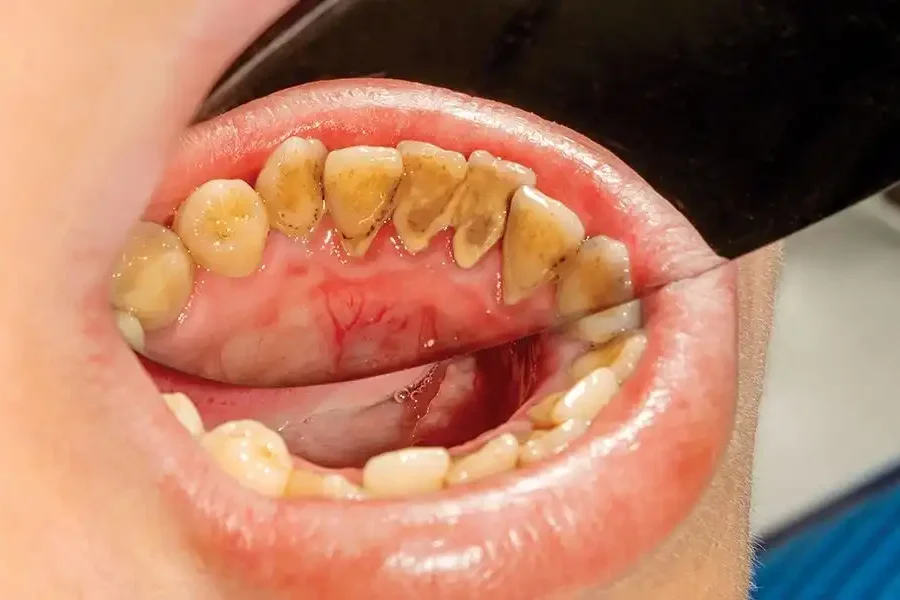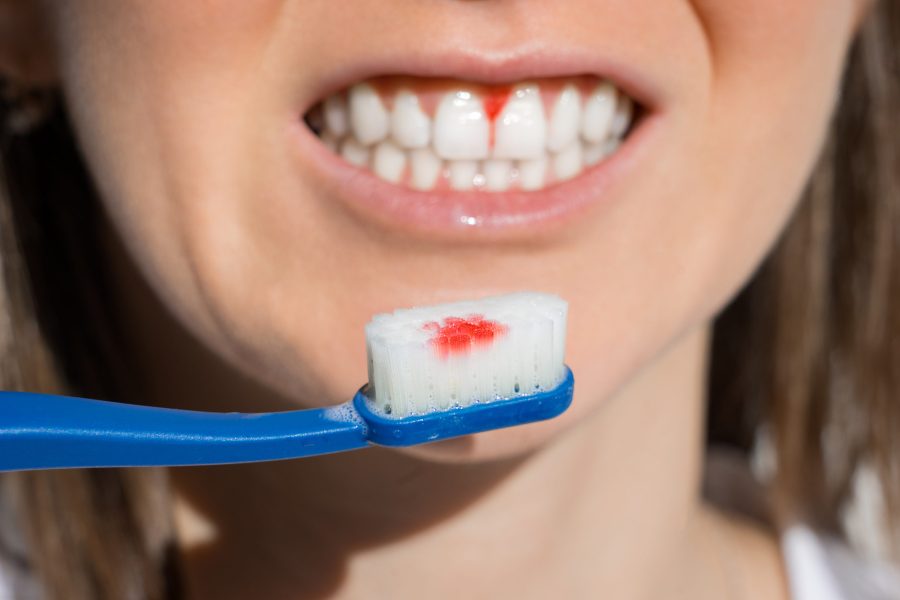
A tooth abscess is a painful condition caused by infection in the tooth and surrounding tissues. Early diagnosis and treatment are essential. This article will cover important topics such as what a tooth abscess is, why it occurs, how it is treated, and how to prevent it.
- What is a Tooth Abscess?
A tooth abscess is a severe condition caused by infection in the tooth and surrounding tissues. This infection usually begins when bacteria damage the tooth tissue. As the disease progresses, a pus-filled cavity forms inside or around the tooth.
This condition can cause severe pain, swelling, and other uncomfortable symptoms. If left untreated, a tooth abscess can lead to severe complications and negatively affect overall health.
Types of Tooth Abscess
Tooth abscesses are usually classified into two main types: periapical and periodontal. A periapical abscess occurs when an infection develops at the tip of the tooth root. When an infection starts in the pulp tissue (the area containing nerves and blood vessels) inside the tooth, it can spread to the surrounding tissues and cause a periapical abscess. This often results from tooth decay or damage, such as a cracked tooth.
A periodontal abscess occurs when an infection develops in the periodontal pockets (spaces under the gums). Factors such as gum disease, gum recession, or poor oral hygiene can cause periodontal abscesses. Both types of abscesses can lead to serious complications if not treated in time.
How Does a Tooth Abscess Affect Overall Health?
A tooth abscess can negatively impact not only oral health but also overall health. Abscesses can spread throughout the body, leading to various complications. Here are the adverse effects of a tooth abscess on overall health:
- Systemic Infections: The infection from a tooth abscess can spread through the bloodstream to other organs and tissues, causing severe systemic diseases such as sepsis.
- Heart Health Issues: Tooth abscess infections can affect the valves and lead to heart diseases such as endocarditis.
- Respiratory Problems: Infections in the mouth and throat can impact the respiratory system and cause breathing difficulties.
- Lymphatic Circulation Issues: Infection can lead to swollen lymph nodes and disrupt lymphatic circulation.
- General Fatigue and Weakness: Chronic infections can weaken the body, causing fatigue and general weakness.
- Increased Risk of Other Infections: A tooth abscess can compromise the immune system, increasing the risk of other infections.
Early diagnosis and treatment of a tooth abscess are crucial to prevent serious complications.
Tooth Abscess Symptoms
A tooth abscess can present with various symptoms and requires careful examination for a diagnosis. One of the most notable symptoms of a tooth abscess is severe and persistent toothache. The pain may radiate to surrounding tissues, including the head, neck, or ears.
Gums near the site of infection may experience noticeable swelling and redness. An infected gum or tooth may also become sensitive to hot, cold, or pressure from food and drinks.
A bad taste or odor may emanate from the affected area, often caused by the pus-filled cavity. A tooth abscess can present as a general feeling of discomfort or a sensation of soreness in the mouth. Swallowing may become painful and uncomfortable.
In advanced stages, a tooth abscess may cause an increase in body temperature, resulting in a fever. Chronic infection, such as a tooth abscess, can cause fatigue, weakness, and restlessness.
What Causes a Tooth Abscess?
A tooth abscess arises from a combination of factors. Tooth decay occurs when bacteria damage the tooth enamel and dentin layers. A decayed tooth allows bacteria to reach the tooth’s inner part, causing an infection. This results in a periapical abscess, an infection at the tip of the tooth root.
Cracks or fractures in teeth can allow bacteria to reach the tooth’s inner part, thus causing an infection. This can also lead to a periapical abscess. Gum disease, infections, and inflammation can prepare the way for infection under the gums, resulting in an abscess.
Incorrect brushing technique, insufficient brushing frequency, or failure to floss regularly can facilitate the development of gum disease, which can lead to tooth abscesses. People with weakened immune systems may be less capable of fighting infections, increasing the risk of tooth abscesses.
Dental Treatment Methods
Treatment of a tooth abscess depends on the infection’s type, severity, and extent. Here are some commonly used methods for treating tooth abscesses:
- Draining: A tooth abscess often results in a pus-filled cavity. Draining is essential to prevent the spread of the infection. The dentist can make a small incision to drain the abscess or place a drain to facilitate the drainage.
- Root Canal Treatment: In cases of periapical abscess, a root canal treatment may be applied to clean the infection inside the tooth and save the tooth. The procedure involves cleaning, disinfecting, and filling the tooth’s interior canals.
- Tooth Extraction: If a tooth abscess is severe or untreatable, it may need to be extracted. This involves completely removing the infected tooth.
- Antibiotics: Antibiotics may be used to control the spread of the infection and combat the infection. However, antibiotics alone are typically a temporary solution and are often used alongside other treatments.
Treatment of a tooth abscess varies for each patient, and many factors must be considered when determining the treatment approach. Therefore, a dentist should be consulted to find the most suitable treatment option.
Does a Tooth Abscess Heal on Its Own?
Usually, a tooth abscess does not heal independently and requires treatment. Leaving a tooth abscess untreated can lead to the spread of infection and severe complications. Therefore, it is essential to seek prompt dental care when noticing tooth abscess symptoms.
Can a Tooth Abscess Recur?
Yes, a tooth abscess can recur. The likelihood of recurrence depends on addressing the underlying causes and providing appropriate treatment. A tooth abscess often arises due to underlying dental issues such as tooth decay, cracks, or fractures. If these problems are left untreated, the infection may recur.
Treatment of a tooth abscess involves cleaning the infection, restoring the tooth, and controlling the infection. If the treatment is not fully applied or the infection is not entirely cleared, there is a higher risk of recurrence. Regular brushing, flossing, and regular dental check-ups can reduce the risk of recurrence.
When Should You Visit the Dentist?
A dentist should be consulted when tooth abscess symptoms are noticed, or any oral discomfort is felt. However, immediate dental care is required in the following situations:
- Severe Toothache: Sudden and severe toothache may indicate a serious problem such as a tooth abscess. The pain may intensify without any triggers or increase upon contact with hot or cold foods.
- Swelling and Redness: Noticeable swelling and redness in the gums or around the tooth may indicate the spread of infection.
- Fever: Infections such as tooth abscesses often cause fever. Any increase in body temperature should prompt an immediate visit to the dentist.
- General Weakness and Fatigue: Chronic infections can cause general weakness and fatigue. These symptoms may indicate that the infection is spreading.
- Difficulty Swallowing: Oral infections can cause pain and difficulty swallowing.
- Lousy Taste or Odor: A bad taste or odor from the mouth may indicate an infection, such as a tooth abscess.
Any of these symptoms should prompt an immediate visit to the dentist. Early diagnosis and treatment can prevent severe complications and protect dental health.
How to Relieve Tooth Abscess Pain?
Tooth abscess pain can be severe and uncomfortable. Here are some methods to try to alleviate the pain:
- Pain Relievers: Over-the-counter pain relievers such as acetaminophen, ibuprofen, or naproxen may help relieve tooth abscess pain. However, consult a doctor or pharmacist before using these medications.
- Antibiotics: A tooth abscess often requires antibiotic treatment. Taking antibiotics as your doctor prescribes can help control the infection and alleviate pain.
- Cold Compress: Applying a cold compress to the affected area can help relieve pain and reduce swelling. You can use an ice pack or a cloth dampened with cold water. However, avoid direct contact with the skin and limit usage time.
- Heat Application: Some people find relief from tooth pain with warm compresses or warm drinks. Consult your doctor before using this method to prevent the infection from spreading.
- Rest and Stress Management: Tooth abscess pain can worsen with stress and tension. Resting, avoiding stress, and practicing stress management techniques can help alleviate pain.
Tooth abscess pain is a severe condition, and long-term solutions should involve consulting a dentist. Pain relievers provide temporary relief, but cleaning and treating the infection can prevent the recurrence of the condition.




